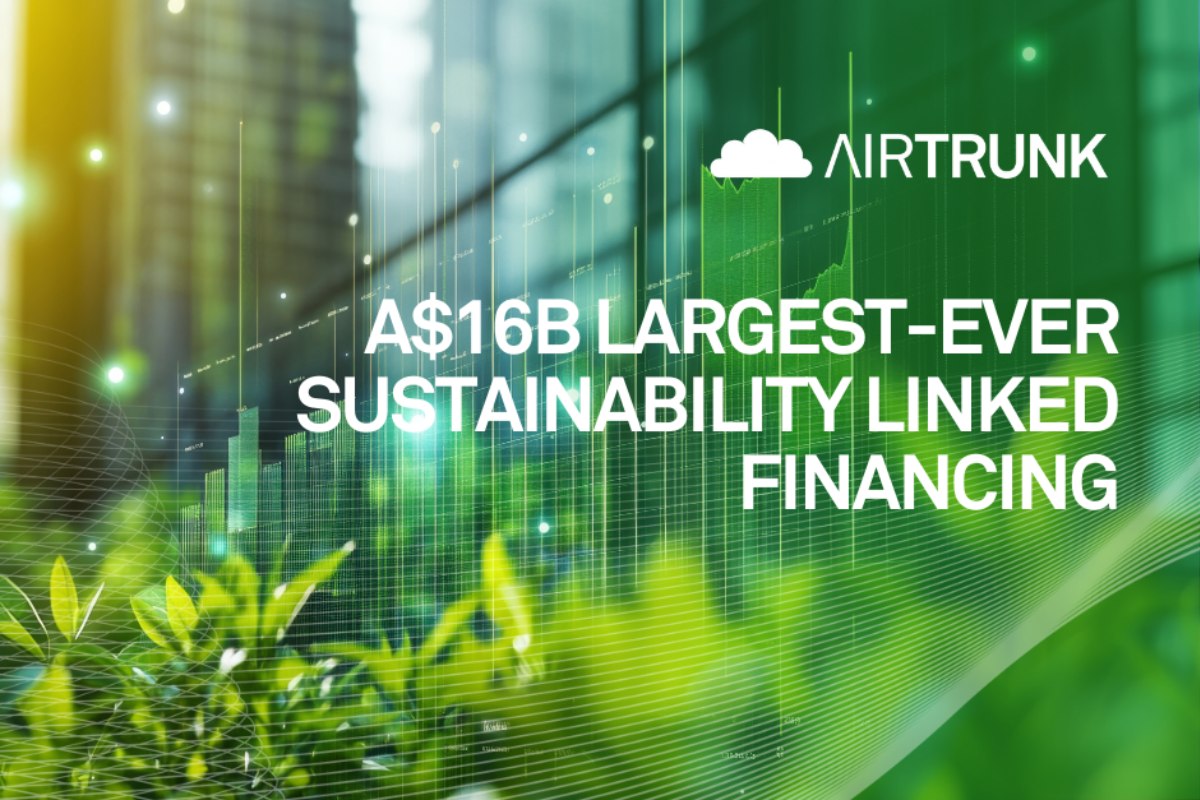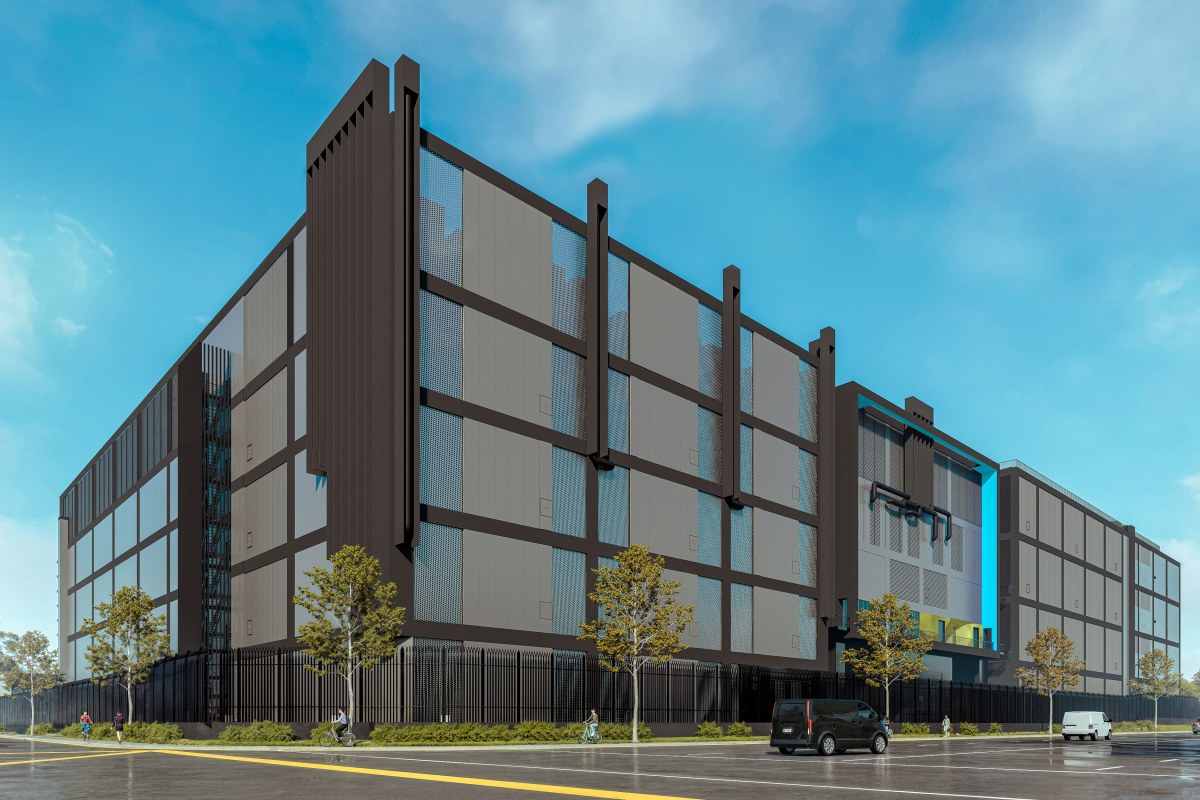Data Centre Business News and Industry Trends
Data Centre Business News and Industry Trends
Insights into Data Centre Investment & Market Growth
News
AirTrunk secures A$16bn sustainability-linked financing
Hyperscale data centre operator AirTrunk has completed a A$16 billion (£7.6 billion) refinancing package (excluding Japan), which it says is the largest sustainability-linked financing in the Asia-Pacific and Japan region to date. The multi-transaction deal covers both new and operational assets in Australia, Hong Kong, Malaysia, and Singapore.
AirTrunk first introduced a sustainability-linked loan (SLL) in 2021 worth A$2.1 billion (£1 billion), which increased to A$4.6 billion (£2.2 billion) in 2023. The new refinancing brings the company’s total debt financing platform to more than A$18 billion (£8.6 billion), including its facilities in Japan. Over 60 banks and financiers participated in the latest package.
Structure and sustainability targets
The refinancing comprises four separate sustainability-linked transactions structured as either green loans or SLLs. AirTrunk has set targets across energy and water efficiency, renewable energy uptake, and gender pay equity. The company has stated its goal is to reach net-zero emissions by 2030.
All margin incentives from the financing will be directed into AirTrunk’s social impact fund, which will grow over the course of the loans. The fund supports initiatives including disaster relief, STEM education, equal digital access, biodiversity projects, and sustainable innovation. AirTrunk says it is the first known corporate to embed disaster relief into its financing structure.
In Singapore, a S$2.25 billion (£1.29 billion) green loan will fund the development of AirTrunk SGP2 in Loyang and is described as Singapore’s largest green loan for a data centre. In Melbourne, the company has arranged what it calls the largest green loan in the region and the first globally to include margin adjustments linked to a social impact programme.
Robin Khuda, Founder and Chief Executive Officer of AirTrunk, comments, “Following AirTrunk’s A$24 billion-plus (£11.5 billion) acquisition by Blackstone and CPPIB in 2024, we have expanded our debt financing platform to enable rapid growth across the region.
"By linking all A$18 billion (£8.6 billion) of our financing to sustainability, we demonstrate our long-term commitment to scale responsibly, building essential digital infrastructure to power the digital economy, while delivering lasting positive environmental and social impact.”
Luke Stephens, Vice President and Treasurer at AirTrunk, adds, “This A$16 billion-plus (£7.6 billion) refinancing is a major milestone in AirTrunk’s sustainable finance journey, driving both innovation and transparency.
"From leading the industry with the first SLL in 2021 to today’s multi-transaction structure, we’ve consistently pushed boundaries to drive responsible growth and create meaningful social value.”
For more from AirTrunk, click here.
Joe Peck - 26 August 2025
Data Centre Business News and Industry Trends
Insights into Data Centre Investment & Market Growth
News
DC automation market to surpass $50.2bn by 2034
As reported in the latest study by Global Market Insights, a market research and consulting company, the data centre automation market is set to grow from its current market value of more than $11.4 billion (£8.47 billion) to over $50.2 billion (£37.3 billion) by 2034.
This remarkable growth is driven by the rising adoption of cloud services, social media platforms, video streaming, and the proliferation of IoT devices across industries.
What's happening in the market?
As organisations shift towards cloud-based infrastructure and digital storage, the need for efficient and automated data centre operations has become paramount. Automation not only improves operational efficiency but also reduces human errors, ensuring seamless management of vast amounts of data.
With increasing data complexity and volume, businesses are turning to advanced technologies like machine learning (ML), artificial intelligence (AI), and cloud computing to enhance scalability and performance. These technologies optimise system processes, minimise downtime, and support predictive maintenance, allowing companies to stay competitive in a rapidly evolving digital landscape.
Moreover, the growing emphasis on cybersecurity and data protection is pushing organisations to implement automation in data centres, ensuring real-time threat detection and secure data handling.
As more industries adopt hybrid and multi-cloud environments, the demand for data centre automation solutions is expected to surge, paving the way for innovative advancements in automation technologies.
Government initiatives promoting the adoption of digital infrastructure and cloud technologies further strengthen the market, making data centre automation a critical component of modern business strategies.
The data centre automation market is primarily segmented into solutions and services. The solution segment dominated the market with a 60% share, generating $7 billion (£5.2 billion) in 2024.
Automation software helps organisations optimise resource allocation, automate routine tasks, and increase the uptime of data centres, ensuring seamless operations. As businesses strive to enhance operational efficiency, the demand for advanced solutions that enable real-time data management and workload automation continues to rise.
Meanwhile, the service segment is growing rapidly as organisations seek expert guidance and ongoing support in implementing and maintaining automated systems. As technological advancements accelerate, companies rely on expert insights and strategic consulting to maximise the value of their automation investments and ensure long-term success.
In terms of deployment mode, the data centre automation market is divided into on-premises and cloud-based solutions. The cloud segment held a 57% share in 2024, driven by the growing preference for remote accessibility, security features, and flexibility.
Cloud solutions enable seamless access to data from any location through an internet connection, making them ideal for remote teams and individuals working across multiple devices.
With data security becoming a top priority, cloud providers are enhancing their security measures by offering encryption, multi-factor authentication, and real-time threat monitoring to protect sensitive information.
The North American data centre automation market accounted for 35% of the total market share, generating $3 billion (£2.2 billion) in 2024. The rapid adoption of AI, ML, and other advanced technologies across data centres in North America is driving significant growth in the region.
Businesses are increasingly turning to AI-driven automation to enhance operational efficiency, strengthen security, and enable predictive maintenance, contributing to the surging demand for data centre automation solutions.
Joe Peck - 21 August 2025
Data Centre Business News and Industry Trends
Data Centres
Insights into Data Centre Investment & Market Growth
News
DC BLOX recognised on Inc. 5000 list for fifth year
DC BLOX, a provider of connected data centres and fibre networks, has been named to the Inc. 5000 list of fastest-growing private companies in the United States for the fifth consecutive year. The ranking reflects the company’s revenue growth between 2021 and 2024.
Headquartered in the Southeastern United States, DC BLOX operates connected data centres and fibre networks across the region. Its recent projects include the completion of new fibre routes, plans to develop hyperscale edge node data centres, and ongoing work on its Myrtle Beach Cable Landing Station campus.
Expanding digital infrastructure in the US Southeast
Jeff Uphues, CEO of DC BLOX, comments, “Being recognised for the fifth year in a row by Inc. Magazine is a tremendous honour and a testament to the dedication of our entire team.
"Our growth is driven by the accelerating demand for reliable, high-capacity digital infrastructure in the Southeast, and we remain steadfast in our mission to support the region’s technology investments and economic growth.”
Alongside its Myrtle Beach site, DC BLOX has announced plans to build a second subsea cable landing station campus in Palm Coast, Florida. The company says these initiatives are designed to improve connectivity for hyperscalers, communications providers, enterprises, and government bodies, supporting applications such as high-performance computing and artificial intelligence.
In its most recent development, DC BLOX secured a $1.15 billion (£852 million) green loan to support the build-out of its Atlanta data centre campus. The facility is intended to provide sustainable hyperscale capacity to meet the region’s growing requirements.
For more from DC BLOX, click here.
Joe Peck - 20 August 2025
Data Centre Business News and Industry Trends
Data Centre Regulations & UK Compliance Updates
Data Centre Security: Protecting Infrastructure from Physical and Cyber Threats
Security Risk Management for Data Centre Infrastructure
4 in 5 CISOs say DeepSeek must be regulated
According to cybersecurity company Absolute Security’s UK Resilience Risk Index Report, four in five (81%) UK CISOs (Chief Information Security Officers) believe DeepSeek - a China-based AI chatbot raising global security concerns - must be urgently regulated by the UK Government before it sparks a full-scale national cyber crisis.
In response to these growing risks, over a third (34%) have implemented full bans on AI due to cyber security concerns, while 30% of CISOs say they’ve already pulled the plug on AI tools within their organisation.
The findings come from a recent survey commissioned by Absolute Security, which polled 250 UK CISOs at enterprise organisations via independent research agency Censuswide, to assess how businesses are coping with accelerating cyber challenges in an increasingly AI-powered world.
DeepSeek, the rapidly rising AI platform, has raised significant cybersecurity concerns due to its potential to expose sensitive data and be misused by cybercriminals. These issues have led organisations and governments to reconsider their cybersecurity strategies.
Businesses are already struggling to cope with the increasing complexity of cyber threats, as shown by the recent Harrods breach among others. However, as CISOs grapple with this evolving landscape, the added layer of AI-powered threats is prompting a re-evaluation of cyber defences.
Three out of five (60%) UK CISOs now predict a rise in cyber attacks as a direct result of DeepSeek, with another 60% saying this AI technology is already complicating privacy and governance frameworks, making their jobs more difficult.
These concerns reflect a clear shift in mindset, with 42% of CISOs now seeing AI as a bigger threat than a help to cybersecurity.
The readiness gap is just as concerning, with nearly half (46%) of security leaders admitting their teams are not prepared to handle AI-driven threats, such as those posed by tools like DeepSeek. The rapid development of DeepSeek is outpacing their defences, according to survey findings, creating a growing risk that many believe can only be managed through government regulation.
Andy Ward, SVP International of Absolute Security, comments, “Our research highlights the significant risks posed by emerging AI tools like DeepSeek, which are rapidly reshaping the cyber threat landscape.
"As concerns grow over their potential to accelerate attacks and compromise sensitive data, organisations must act now to strengthen their cyber resilience and adapt security frameworks to keep pace with these AI-driven threats. That’s why four in five UK CISOs are urgently calling for government regulation. They’ve witnessed how quickly this technology is advancing and how easily it can outpace existing cybersecurity defences.
"These are not hypothetical risks. The fact that organisations are already banning AI tools outright and rethinking their security strategies in response to the risks posed by LLMs like DeepSeek demonstrates the urgency of the situation.
"Without a national regulatory framework - one that sets clear guidelines for how these tools are deployed, governed, and monitored - we risk widespread disruption across every sector of the UK economy. The time for debate is over. We need immediate action, policy, and oversight to ensure AI remains a force for progress, not a catalyst for crisis.”
Despite the risks, investment in AI talent is accelerating. 84% of organisations are prioritising the hiring of AI specialists in 2025, and 80% have committed to AI training at the C-suite level, hoping that upskilling AI talent can outweigh any increasing threats.
Most companies don’t intend to retreat from AI; they want to face it head-on. To use AI safely, CISOs say they need clear rules, stronger government oversight, a skilled AI workforce, and a national plan to deal with the specific risks of DeepSeek and similar tools.
Joe Peck - 19 August 2025
Data Centre Business News and Industry Trends
Insights into Data Centre Investment & Market Growth
News
DC chip market to surpass $62.9bn by 2034
According to a recent report by Global Market Insights, a US-based market research and consulting company, the global data centre chip market was valued at $15.6 billion (£11.5 billion) in 2024 and is projected to reflect a robust CAGR of 15.2% between 2025 and 2034.
The growth is fuelled by the rising demand for artificial intelligence (AI), machine learning (ML), and high-performance computing.
The source of the demand
As businesses continue to embrace digital transformation, the need for advanced data processing capabilities has never been greater.
Organisations are shifting to cloud-based platforms, relying on AI-driven analytics, and deploying sophisticated computing solutions to manage vast volumes of data efficiently. These advancements are fuelling the expansion of data centre chip technologies, making them essential components in modern computing infrastructures.
The rapid deployment of 5G networks, growing data traffic, and increasing reliance on cloud services are accelerating market demand. Enterprises are heavily investing in next-generation chips to optimise computing power, enhance energy efficiency, and reduce latency in data processing.
The shift toward edge computing, where real-time processing is critical, further underscores the necessity of cutting-edge chip technologies.
With data-intensive applications becoming mainstream across industries, semiconductor manufacturers are focusing on designing chips with superior processing capabilities, improved power efficiency, and enhanced security features.
A view of the market
The data centre chip market is segmented by chip type, including central processing units (CPU), graphics processing units (GPU), field-programmable gate arrays (FPGA), application-specific integrated circuits (ASIC), and others.
CPUs generated $4.7 billion (£3.47 billion) in 2024, driven by the increasing adoption of cloud computing, the migration of IT infrastructure to virtual environments, and growing computational demands from AI applications.
As the backbone of modern computing, CPUs enable seamless system operations, supporting everything from enterprise software to data analytics. The demand for high-speed processing power continues to surge, particularly as AI-based workloads expand across industries.
Based on industry verticals, the data centre chip market is witnessing high adoption across BFSI, government, IT and telecom, transportation, energy and utility, and other sectors.
The BFSI sector accounted for 26.7% of the market share in 2024, fuelled by the need for secure, high-speed data processing and the increasing adoption of blockchain technology. With fintech companies and digital banking platforms expanding rapidly, the demand for advanced chip technologies in financial services is at an all-time high.
Data centre chips play a pivotal role in ensuring transaction security, minimising downtime, and enhancing overall operational efficiency for financial institutions.
North America dominated the global data centre chip market with a 37.2% share in 2024, led by substantial investments in AI, machine learning, and cloud computing. The United States accounted for $4.4 billion (£3.25 billion) in market revenue and is projected to grow at a CAGR of 15.4% through 2034.
The country's strong focus on semiconductor manufacturing, AI-driven computing, and real-time data processing positions it as a key player in the global data centre chip landscape. As cloud adoption and government initiatives in semiconductor R&D continue to rise, North America looks set to maintain its leadership in the evolving market.
Joe Peck - 18 August 2025
Data Centre Build News & Insights
Data Centre Business News and Industry Trends
Data Centre Projects: Infrastructure Builds, Innovations & Updates
Insights into Data Centre Investment & Market Growth
AirTrunk secures S$2.25bn green loan for Singapore DC
Hyperscale data centre specialist AirTrunk has secured a S$2.25 billion (£1.3 billion) green loan in Singapore to finance its new hyperscale data centre, SGP2. The deal is Singapore’s largest-ever loan (and green loan) for a data centre project.
The transaction supports the development of sustainable digital infrastructure and reinforces Singapore’s position as a major green finance hub in Asia. The loan aligns with the Technical Screening Criteria of the Singapore-Asia Taxonomy for Sustainable Finance, as well as AirTrunk’s Green Financing Framework.
Largest green loan for a data centre in Singapore
Crédit Agricole CIB, DBS Bank, and ING Bank acted as global coordinators and sustainability structuring agents for the financing, working alongside a consortium of 23 other financial institutions.
MUFG Bank, Natixis CIB, Standard Chartered Bank (Singapore), and United Overseas Bank were among the mandated lead arrangers.
The financing begins as a green loan, with the option to transition into a sustainability-linked loan (SLL). All financial incentives will be directed to AirTrunk’s social impact fund.
Robin Khuda, Founder and Chief Executive Officer at AirTrunk, comments, “This landmark transaction – Singapore’s largest loan and green loan for a data centre – strengthens AirTrunk’s leadership in sustainable finance and reflects strong market confidence in AirTrunk’s growth and sustainability strategy.
"This financing structure highlights the strength, depth, and international scale of Singapore’s financial ecosystem.”
AirTrunk’s SGP2 campus, located in Loyang, will provide more than 70MW of cloud and artificial intelligence compute capacity for Singapore and Southeast Asia.
The facility is designed to achieve a BCA Green Mark Platinum rating and a Power Usage Effectiveness (PUE) of 1.20, one of the lowest in Singapore. Green concrete and green steel are also being used in construction to cut embodied carbon.
For more from AirTrunk, click here.
Joe Peck - 18 August 2025
Commercial Real Estate: Property Developments, Trends & Infrastructure
Data Centre Business News and Industry Trends
Data Centres
News
Frankfurt becomes 1GW DC market, closing in on London
The colocation data centre market in Frankfurt grew past the 1GW mark in Q2 2025 and narrowed the gap with London, Europe’s largest market, in the process.
According to new research from US commercial real estate company CBRE, the Frankfurt market closed at 1.02GW in the second quarter, including 26MW of new capacity.
Frankfurt, Europe’s second-largest market, is now just 114MW smaller than London, the largest market since CBRE initiated coverage of colocation data centres in 1999.
Over the past decade, the supply of Frankfurt has grown 20% per annum, on a compounded basis. The growth of Germany’s financial capital has largely been driven by hyperscalers and digital service providers whose investment has led to new developments in the metro area and expansion efforts in submarkets such as Offenbach.
“Frankfurt’s growth is remarkable given the difficulties providers are having securing the necessary power, appropriate land, and the regulation that providers must consider within the city,” comments Andrew Jay, Head of Data Centre Solutions, Europe at CBRE.
“Nevertheless, interest in Frankfurt remains particularly high, driven by the need to deliver digital services, as well as keeping sought-after supply away from competitors.”
Dirk Turek, Associate Director, European Data Centre Research at CBRE, adds, “Frankfurt’s high growth period began in 2019, when hyperscalers expanded their presence in the market.
"Frankfurt’s growth potential is still relatively high, though additional demand is unlikely to be met by providers in the city’s largest data centre clusters, given electricity grid constraints. Established submarkets in Frankfurt will grow, albeit slowly, while new submarkets are formed.”
For more from CBRE, click here.
Joe Peck - 14 August 2025
Data Centre Business News and Industry Trends
Insights into Data Centre Investment & Market Growth
News
New CEO of Telefónica Tech UK&I named
Telefónica Tech UK&I, the UK and Ireland arm of Telefónica's technology services division that provides cybersecurity, cloud, IoT, and digital transformation services, has announced the appointment of Martyn Bullerwell as its new Chief Executive Officer.
Martyn joined Telefónica Tech through the acquisition of the company he founded and has since served as Vice President of the Data & AI Practice.
With extensive experience in technology leadership and a track record in scaling businesses, the company believes he is well positioned to head its next phase of growth in the UK and Ireland.
Prior to joining Telefónica Tech, Martyn built and grew his own technology business, developing skills across data, artificial intelligence, and digital transformation. Since becoming part of Telefónica Tech, he has played a key role in expanding the company’s capabilities in these strategic areas.
This appointment follows the decision by Mark Gorton to step down as CEO after six years with Telefónica Tech UK&I, three of them in the top role.
Mark initially joined as Vice President of Sales and Marketing and was a figure in the transformation of the business following its acquisition by Telefónica Tech in 2021, as well as in the integration of Incremental Group in 2022.
Commenting on his appointment, Martyn states, "I am excited to take on this role and to build on the strong foundation laid by Mark and the leadership team. We will continue to focus on delivering value for our customers and driving sustainable growth in our markets."
This appointment comes at a time of reported growth for Telefónica Tech UK&I. In March 2025, the company opened its new headquarters in London at 20 Fenchurch Street, designed as a hub for innovation, collaboration, and engagement with customers and partners.
For more from Telefónica, click here.
Joe Peck - 13 August 2025
Commercial Real Estate: Property Developments, Trends & Infrastructure
Data Centre Business News and Industry Trends
Insights into Data Centre Investment & Market Growth
News
Cresa launches DC capital markets platform
Cresa, a US-based commercial real estate advisory firm, has launched a new Data Center Capital Markets and Advisory platform following the appointment of Michael Morris, Sumner Putnam, and Matt Deutsch, previously of Newmark.
The team, which has led data centre transactions across more than 50 global markets, will expand Cresa’s service offering to include advisory, transaction structuring, and capital markets services focused on major data centre projects.
Michael Morris, who will lead the new platform as President, has been involved in more than 1,000 data centre real estate transactions and brings decades of experience to the role. He will be based in Cresa’s New York City office and supported by colleagues across the United States.
“The data centre infrastructure expansion underway is one of the most important technological challenges of our time,” says Tod Lickerman, CEO of Cresa.
“Michael and his team are true data centre leaders and provide significant, unique advantages to our clients with strong insight, advocacy, and the ability to get deals done.”
Michael previously served as Vice Chairman at Newmark and established the firm’s data centre practice almost two decades ago. His past client list includes Digital Realty Trust, Verizon, CyrusOne, Memorial Sloan Kettering, CoreSite, New York University, Landmark Dividend, Chevron, and multiple hyperscale providers.
He holds data centre design qualifications including Certified Power Quality Professional (CPQ) and Data Center Dynamics Cooling Professional, and an MBA in Finance from the Zicklin School of Business at Baruch College.
“I am pleased to be joining Cresa to build a global practice,” comments Michael. “I was drawn to the firm’s shared vision, and I’m looking forward to serving as a board advisor to help shape its future.”
Sumner Putnam joins as Managing Principal. He was also part of Newmark’s data centre team and previously worked at JLL. His expertise includes site selection, lease negotiation, and colocation agreements, with experience supporting clients such as CyrusOne, NYU, HSBC, Bank of America, Tumi, and Mapletree.
The team also includes Cresa Senior Analyst Mackensey Gawne, and will collaborate with global data centre specialists from Cresa’s international partner, Knight Frank, with whom Morris has worked for nearly 25 years. The group will support a range of client types, including landlords, tenants, buyers, and sellers.
In addition to its focus on data centre and mission-critical environments, the team will continue to support office sector clients with broader real estate requirements.
Joe Peck - 8 August 2025
Data Centre Business News and Industry Trends
Insights into Data Centre Investment & Market Growth
News
Wilmott Group officially joins Rehlko
The Wilmott Group, a UK provider of critical power projects and generator installations, has announced the successful completion of its acquisition by Rehlko (formerly Kohler Energy), a US-based manufacturer of power systems, marking the beginning of a new chapter in the company’s 40-year history.
The acquisition sees The Wilmott Group, including WB Power Services (WBPS) and Wiltech Acoustics, become an official part of Rehlko’s EMEA operations.
“This marks a hugely exciting and pivotal milestone for The Wilmott Group,” says Andy Wilmott, Co-CEO and Chairman. “Now that the acquisition is complete, we are officially part of a global leader in energy resilience.
"Rehlko shares our values of long-term customer focus, operational excellence, and innovation - principles we’ve been proud to uphold since 1983. Together, we’re equipped to elevate our services to new heights.”
Brian Melka, President and Chief Executive Officer of Rehlko, adds, “This is an exciting moment for Rehlko as we bring The Wilmott Group into our family.
“We’re thrilled to provide our customers with even greater impact, especially as we deepen our collaboration in the data centre space throughout the UK and Europe.
"Together, we’re positioned to transform the energy resilience and security industry through enhanced efficiency and cutting-edge solutions.”
The Wilmott Group says it remains committed to its "power you can trust" mission. Backed by Rehlko’s global scale and investment, it believes it is now better positioned to meet the evolving demands of mission-critical industries.
Joe Peck - 6 August 2025

Head office & Accounts:
Suite 14, 6-8 Revenge Road, Lordswood
Kent ME5 8UD
T: +44 (0)1634 673163
F: +44 (0)1634 673173









